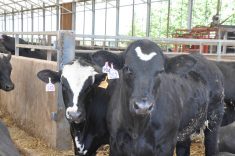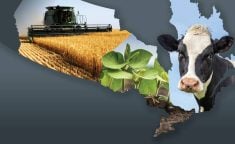Canada has its first Indo-Pacific agriculture office, and the Canadian ag sector is pretty happy about the news.
An Agriculture and Agri-Food Canada release Feb. 21 marked the opening of the office in Manila, Phillipines, and included words of support from commodity groups spanning Canada’s cattle, pork, canola, pulses and cereals sectors, among others.
“The Indo-Pacific provides a unique opportunity for growth and diversification for Canadian pulses,” said Pulse Canada chair Kevin Auch. “This office demonstrates the Government of Canada’s support for our sector proactively breaking down market access barriers and playing a direct role in expanding exports of high-quality, sustainable pulses across the region.”
Read Also

Flour production slumps in the U.S., increases in Canada
U.S. flour production in 2025 was the lowest in 14 years.
The Indo-Pacific region is home to 11 of Canada’s top 20 trading partners.
Chris Davison, president of the Canola Council of Canada, echoed the sentiment, saying the region “represents both key established markets as well as diversification opportunities for Canadian canola,” and adding that “additional resources and an enhanced and sustained presence in the region are important to advancing both market access and market development efforts to support the growth and competitiveness of our industry and the broader sector.”
Dean Dias, CEO of Cereals Canada, said the region represents about $2.3 billion in sales for Canadian cereals.
Nathan Phinney, president of the Canadian Cattle Association, linked the new office to trade gains under the Comprehensive and Progressive Agreement for Trans-Pacific Partnership, signed between Canada and 10 other countries: Australia, Brunei, Chile, Japan, Malaysia, Mexico, New Zealand, Peru, Singapore and Vietnam.
The catle sector has seen “export opportunities continue for our high-quality Canadian beef to the Indo-Pacific region including with countries such as Japan, Korea, and Vietnam,” he said. “We are pleased to see the Government of Canada supporting our global trade efforts by opening this Indo-Pacific office, supporting our valued strategic partnership, and opening more trade avenues for Canadian beef producers.”
The Canadian Pork Council called the opening a “milestone.”
China, Japan and the Philippines are among Canada’s top pork buyers, Statistics Canada data shows. Korea and Taiwan are also hefty customers. In recent years, efforts have been also been made to increase sales to Vietnam.
“This initiative reflects our commitment to strengthening global partnerships and expanding market access for Canadian pork producers,” pork council chair René Roy said in a separate release.
The Indo-Pacific Agriculture and Agri-Food Office (IPAAO) is a joint effort between AAFC and the Canadian Food Inspection Agency and is part of a plan to “increase and diversify Canada’s agriculture and agri-food exports to the Indo-Pacific,” Prime Minister Justin Trudeau said in a November 2022 news release announcing the initiative.
Long-time Canadian diplomat Diedrah Kelly was appointed as the office’s first executive director.
IPAAO staff are already in Manila, “working with partners to advance shared priorities, such as food security, create mutually beneficial opportunities, build on strong relationships and enhance technical cooperation, market access and trade,” the Feb. 21 government release said.
“We export nearly half of what we produce in Canada and the global demand continues to grow,” said federal agriculture minister Lawrence MacAulay. “I have no doubt this office will play a central role in growing export markets for our world-class Canadian farmers and increasing collaboration and co-operation in this important region.”
Chris White, president of the Canadian Meat Council, called MacAulay “an ardent ally” who prioritizes collaboration to strengthen reciprocal market access for Canadian red meat.


















